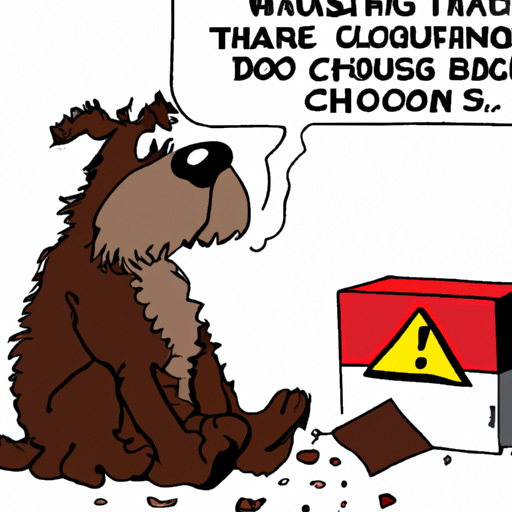Chocolate. It’s a sweet treat that most of us enjoy. It’s rich, comforting, and delicious, and it’s often used as a reward or indulgence. But as much as we love chocolate, it’s important to remember that it’s not safe for our beloved canine companions. In fact, chocolate is toxic to dogs and can cause serious health problems, even death.
Table of Contents
- Understanding Why Chocolate is Harmful to Dogs
- Theobromine: The Culprit Behind Chocolate Toxicity
- What Happens When a Dog Eats Chocolate?
- Types of Chocolate and Their Toxicity Levels
- What to Do If Your Dog Eats Chocolate
- Frequently Asked Questions
Key Takeaways
- Chocolate contains theobromine, a compound that is toxic to dogs.
- The darker the chocolate, the more theobromine it contains.
- If your dog eats chocolate, seek veterinary care immediately.
- Prevention is the best way to protect your dog from chocolate toxicity.
Understanding Why Chocolate is Harmful to Dogs
Chocolate is made from cocoa beans, which contain two substances that can be harmful to dogs: caffeine and theobromine. While humans can easily metabolize these substances, dogs process them more slowly, allowing them to build up to toxic levels in their system. This is the fundamental reason why dogs can’t eat chocolate.
According to the Pet Poison Helpline, chocolate is one of the top ten pet poisons. The site offers a wealth of information on the dangers of chocolate and other common pet poisons.
Theobromine: The Culprit Behind Chocolate Toxicity
The main toxic component in chocolate for dogs is theobromine. It’s a natural compound found in the cacao plant, which is used to make chocolate. Theobromine affects the central nervous system and cardiovascular system, and dogs are notably more sensitive to it than humans.
You can learn more about the effects of theobromine on dogs in this comprehensive article from One Top Dog.
What Happens When a Dog Eats Chocolate?
When a dog consumes chocolate, it may experience a variety of symptoms, depending on the amount and type of chocolate consumed, as well as the dog’s size, health, and individual sensitivity. Symptoms may include restlessness, increased urination, diarrhea, rapid breathing, muscle stiffness, seizures, and in severe cases, heart failure.
For a more detailed look at the symptoms of chocolate poisoning in dogs, you can visit this page.
Types of Chocolate and Their Toxicity Levels
Not all chocolates are created equal when it comes to theobromine content. Darker chocolates and baking chocolates contain the highest levels, making them more dangerous for dogs. Milk chocolate, while still harmful, contains less theobromine. White chocolate contains the least, but it’s still not safe for dogs due to its high fat and sugar content.
Here’s a breakdown of the theobromine content in various types of chocolate:
| Type of Chocolate | Theobromine per Ounce |
|---|---|
| Dry cocoa powder | 800 mg |
| Unsweetened baking chocolate | 450 mg |
| Dark chocolate (70-85% cocoa) | 170 mg |
| Milk chocolate | 60 mg |
| White chocolate | minimal |
What to Do If Your Dog Eats Chocolate
If you suspect your dog has eaten chocolate, it’s important to act quickly. Contact your vet or a pet poison control center immediately. They will likely ask you about your dog’s size, the type and amount of chocolate consumed, and any symptoms your dog is exhibiting.
You can find more information about what to do if your dog eats chocolate on this helpful page.
Frequently Asked Questions
1. Why can’t dogs eat chocolate?
Dogs can’t eat chocolate because it contains theobromine, a compound that is toxic to them. Dogs process theobromine much more slowly than humans, allowing it to build up to toxic levels in their system.
2. What should I do if my dog eats chocolate?
If your dog eats chocolate, seek veterinary care immediately. The faster your dog gets treatment, the better its chances for a full recovery.
3. Can any amount of chocolate be safe for my dog?
No amount of chocolate is safe for dogs. Even small amounts can cause adverse reactions, especially in small dogs. It’s best to keep all chocolate out of your dog’s reach.
In conclusion, while we humans love our chocolate, it’s a substance that’s simply not safe for our furry friends. So next time you’re enjoying a chocolate treat, remember to keep it out of paw’s reach. And if your dog does manage to sneak a bite, contact your vet immediately. It could save your dog’s life.



